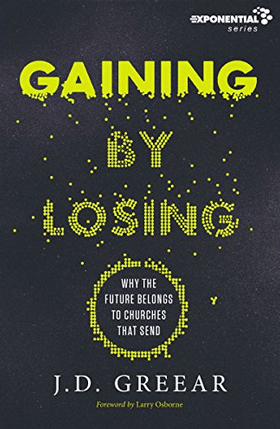by Paul E. Billheimer
In his foreword, Billy Graham wrote:
Every Christian who feels impelled to find a deeper dimension of Christian witness should not only read this book, but study it prayerfully, and apply its principles to his life.
Destined for the Throne is one of those books that is like a smoothie drink made from extremely healthy and delicious ingredients that not only satisfies the taste buds but also nourishes the body. It is packed with scriptural insights, powerful logic, and faith building conclusions. For the most part, I agree wholeheartedly with Billheimer’s statements and conclusions; although, I was uncomfortable with a few of his positions. I will summarize it chapter by chapter.
The Ultimate Goal of the Universe: The Church
In Chapter One, Billheimer convincingly shows that God has a definite purpose for his creation and that…
There is only one philosophy of history that makes sense and that is the Biblical philosophy. (p.21)
He argues that God created the entire universe to provide a suitable habitation for mankind, out of which he would choose an eternal companion or “bride” for his Son.
The church, then – the called-out body of redeemed mankind – turns out to be the central object, the goal, not only of mundane history, but of all that God has been doing in all realms, from all eternity. (p.22)
Using Romans 8:28, he argues convincingly that
As the Lord of history, God is controlling all of its events, not only on earth but in all realms, to serve his purpose of bringing to maturity and eventually to enthronement with his Son, not angels or archangels, but the Church, his chosen Bride. (p.23)
The author opines that the Marriage Supper of the Lamb pictured in the Book of Revelation is the culmination or goal of history. He concludes this thought provoking chapter by writing:
Up until then, the entire universe under the Son’s regulation and control is being manipulated by God for one purpose – to prepare and train the Bride. (p.27)
The ultimate goal is for the church to share Christ’s rule and glory for eternity. This is the theme of the entire book.
God’s Purpose for the Church: Supreme Rank
Billheimer further develops his thesis that the church is the focus of God’s eternal plan in Chapter Two.
Created originally in the image of God, redeemed humanity has been elevated by means of a divinely conceived genetic process known as the new birth to the highest rank of all created beings. (p.33)
He develops this idea by pointing out that angels are created beings, but not “generated” through divine conception, as born again humans are. The new birth elevates humanity to become part of God’s own family, having God’s “seed” and Spirit.
This is God’s purpose in the plan of redemption – to produce, by means of the new birth, an entirely new and unique species, exact replicas of his Son with whom he will share his glory and dominion, and who will constitute a royal progeny and form the governing and administrative staff of his eternal kingdom. (p.37)
It is no wonder that Satan hates the church so greatly. The church, through no merit of her own, but entirely according to God’s incomprehensible mercy and grace, has been elevated to such a high rank that we share in the nature of God and are part of his family.
By these means God has exalted redeemed humanity to such a sublime rank that it is impossible for Him to elevate them any further without bringing them into the inner circle of the Godhead itself. (p.38)
At this point the author introduces an important corollary regarding prayer. He posits that prayer is part of God’s training program to teach the church how to wield Christ’s authority to overcome evil in preparation to exercise sovereign rule through eternity.
The Mystery of Prayer
This chapter is worth the price of the book. The author begins by asking a question many others have posed: since God is sovereign, why did he set up a system that requires his servants to participate through prayer?
God’s promises to answer prayer are so sweeping… as to constitute a veritable carte blanche, that is, a blank card bearing the authority of His own signature. It is as though God handed us His scepter and begged us to use it. (p.45)
Billheimer shows how prayer is God’s means of training his church to participate in his sovereign rule.
Independently and of His own will God makes the decisions governing the affairs of earth. The responsibility and authority for the enforcement and administration of those decisions He has placed upon the shoulder of His Church. (p.46)
In heaven and for eternity, the Church, Christ’s “bride”, will co-reign with him. Here on earth we learn how to rule in our prayer closets. The author proposes that God will never “go over the head” of his church because that would abort the training process and stunt the church’s growth. Billheimer makes a wonderful analogy when he compares prayer to how a safe deposit box is opened. The bank holds a key and the owner of the box holds the other. Neither can open the box without the other. God’s promises constitute one key to the release of his authority and will on the earth. Our prayer is the other. When our prayers align with his will, God’s will will be done. (1 John 5:14-15)
Heaven holds the key by which decisions governing earthly affairs are made, but we hold the key by which those decisions are implemented. (p.52)
He concludes the chapter by stating that prayer has eternal consequences for the world and us. What a challenge to pray more fervently!
Christ’s Gift of Authority
I cannot fully endorse the contents of this chapter. It begins well with a quote of Luke 10:19, but then Billheimer makes a big leap by stating the following.
This is the church’s Magna Carta in her conflict with Satan… It is clear from this and other passages that God intends the true church…to be the controlling factor in human affairs. (p.57)
Although the church is organically unified with Christ through the indwelling Holy Spirit (1 Corinthians 6:17), has already been elevated to Christ’s throne (Ephesians 2:5-6), and shares in our Lord’s authority as his representatives (Luke 10:19), I cannot make the leap to our being the “controlling factor in human affairs.” I believe that is reserved for Christ and the Holy Spirit; even though he privileges the church to participate. Otherwise, the weight of responsibility would be impossible to bear. The government is upon Christ’s shoulders, not ours. (Isaiah 9:6) He is the King.
Quoting Wesley’s words, “God does nothing but in answer to prayer,” the author makes another unsupportable leap when he makes the following statement.
God will not go over the head of his church even to save a soul without her cooperation. If she will not intercede, the Holy Spirit, by his own choice, cannot do his office work of convicting and persuading [the lost]. (p.65)
I do accept that followers of Christ have an important role to play by praying for the lost, both for individuals and for people groups, but I can find nowhere in scripture that specifically says that God will only save those for whom the church specifically prays. How then were the very first disciples saved, since there was no church to pray for them? Is our salvation not because our Father God sovereignly chose us? (Ephesians 1:4-6) Every child of God was chosen by God before the foundation of the world. The Son came to die for those Father God chose. The Holy Spirit is God’s agent to seek out those who are called, chosen, and purchased by Christ’s blood. He works inside us to draw us to Christ. The church is privileged to work in partnership, after we come into our sonship, by preaching the gospel and praying for the lost.
We have a part to play, but our shoulders are not big enough the carry the weight of being responsible for the salvation of every human. Only Christ can carry that.
The Legal Basis for the Authority of the Church
Billheimer addresses what happened with regard to authority at the fall of man in the Garden of Eden. He posits that when God gave Adam and Eve authority and dominion it was a bona fide gift in that it was theirs to do with as they saw fit. Sadly through disobedience they ceded that authority and dominion to Satan, becoming Satan’s slave in the process. This gave Satan the right to mistreat, oppress, and even kill his slaves, who now had no legal rights. In order to redeem mankind and turn this situation around, a man, a Second Adam so to speak, who was born of God so as to escape the terminal fault of having an inborn sin nature, had to perfectly serve the Creator / Father God with unblemished loyalty. This God-Man would also be required to make a perfect sacrifice for our sins in order to pay the just penalty for our rebellion against God. This is why the Incarnation is absolutely critical to our salvation.
The battle of the ages was between Satan and Jesus. Satan leveled all his malevolent power against our Lord in order to seduce him into forsaking his life of obedience to the Father.
The temptation of Gethsemane was to refuse to drink the “cup.” The decision He [Jesus] had to make was whether He would retain the fellowship which He had with the Father before the world began or whether He would accept this unjust, yet genuine identification with [our] sin. (p.78)
In his attempts to compromise Jesus’ obedience, Satan pressed our Lord all the way to the cross, where he died an innocent man while maintaining complete obedience to his Father. This was Satan’s undoing. He murdered an innocent man, which made him a transgressor of God’s justice and gave Christ a complete victory over his foe. (Hebrews 2:14) This victory also belongs to the church.
Christ’s Dynamic Victory
In this chapter Billheimer argues that for Christ to pay the just penalty for our sin he had to be sent to hell, as we would have been. He also points out that the immense cost paid by Christ to secure our salvation was shared by the Father and the Spirit, since they are one. He states that Christ in his “dead” state of three days duration was subsequently “justified in spirit” (1 Timothy 3:16) and “made alive in the spirit” (1 Peter 3:18) by the Father, after he was satisfied that his Son had fully paid our debt (Isaiah 53:10-11). When Jesus burst the bonds of death and rose again, it made him the “first born from the dead” (Revelation 1:5).
Death did its utmost to shackle Him, to keep Him permanently in its grip. All of the resources of the underworld were mustered to prevent his resurrection, but in vain. It was impossible for death to “keep its prey.” (p.87)
When Christ rose again and forty days later ascended to the right hand of God, through the miracle of the Incarnation and Resurrection, “an authentic human being [now] sits on throne of the universe, wielding all the authority of the Godhead.” (p.88)
What is perhaps even more remarkable is that God included his church in this exaltation.
But God, being rich in mercy, because of His great love with which He loved us, 5 even when we were dead in our transgressions, made us alive together with Christ (by grace you have been saved), 6 and raised us up with Him, and seated us with Him in the heavenly places in Christ Jesus, Ephesians 2:4-6 (NASB)
We are not surprised that all things have been put under his [Christ’s] feet. What we have failed to comprehend is that as part of Him, His Body, all things are also legally beneath our feet… We have underestimated the supreme importance of the Church in God’s economy. (p.89)
The author makes the case that Christ’s victory over Satan is our victory, since we are in him and seated with him on his throne.
When He (Christ) defeated Satan, it was our victory. He did not conquer Satan for Himself. The entire substitutionary work of Christ was for His Bride-elect, the Church…Instead of his (Satan’s) having power over us, we have been given authority over him. This is the meaning our enthronement with Christ. (p.91)
The final two chapters are an attempt to reconcile an apparent lack of congruity between Billheimer’s theology with unanswered prayers and unrequited faith. I always find these sorts of lists rather frustrating and tending toward legalism, but his points are worth pondering.
Destined for the Throne clearly lays out the importance of the church in God’s plan. Since we share in Christ’s victory and authority and have been elevated to become sons of God, we should live as if we believe it.
We are in training for co-ruling with Christ for eternity, an eternity which has already begun. It is entirely reasonable to believe that the church should already be engaged in every area of society, functioning as “salt and light.” It goes against our calling for us to retreat into our church “bunker” while ceding every natural realm of influence to Satan’s legion of followers, which is exactly what we have done by and large. Satan has done his level best to convince followers of Christ that we have no right to voice our opinions or take part as a Christian voice in government, education, or science. We are taught that we are descended from apes by a natural process called evolution, thereby stripping us of any eternal importance at all. Worse than that, Satan has convinced hordes of people that they have no significance apart from having pleasure and wielding power. Existentialism teaches us that life consists of experiences and nothing more, consigning mankind to a pointless existence. No wonder more and more young people are committing suicide. In addition, the Great Liar has convinced many that man is actually the earth’s worst problem, setting the groundwork to justify our eradication through depopulation schemes. We must reject these Satanic lies and, from here forward, fully accept who we are in Christ and start acting congruently with our position as God’s children and Christ’s representatives. This first and foremost involves preaching the gospel and making disciples who will go and do the same, but it also includes raising up sons and daughters who will enter the world of politics, education, the arts and media, finance, medicine, science, and society, including the family.
Until Christ returns, we must use our influence to expand God’s benevolent kingdom here on earth in anticipation of his glorious return.
Your kingdom come. Your will be done, On earth as it is in heaven. Matthew 6:10 (NASB95) —




